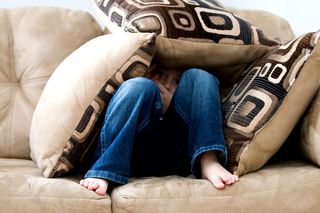Divorce
Understanding the Effects of High-Conflict Divorce on Kids
Research shows how conflict hurts kids, and how to reduce the damage.
Posted December 18, 2019 Reviewed by Jessica Schrader
The Canadian Department of Justice has published the findings of years of research on the effects of high-conflict divorce on children. High-conflict refers to the parents’ verbal or physical altercations witnessed or experienced by the children.

The conclusions are clear. The more extreme your conflict with your spouse or ex, the more your children will suffer in the short and long term.
While some of the research dates back to the 1970s, 1980s, and 1990s, the findings suggest that children are not necessarily negatively affected by living in a single-parent family. This may surprise you. However, much research has shown that family conflict, especially parental conflict, can have an adverse effect on your children’s mental health, adjustment, success in school and future relationships, self-concept and self-esteem.
It is the conflict that is damaging, whether you are married or divorced.
You may wonder if the divorce will damage your children. Studies have concluded that children experience less anxiety and depression when their high-conflict, married parents divorce, and those children whose parents stay married with high-conflict experience higher levels of short- and long-term behavioral and mental health issues.
At the same time, children whose divorced parents continue their high conflict (for example, by continuing litigation) do not experience the same level of relief as those whose parents were able to minimize their conflict.
So it is the conflict, and not necessarily the divorce, that puts your children at risk.
Furthermore, it has been shown that a detailed, written parenting plan that leaves little or no room for disagreement seems to reduce parents’ stress, making it more likely that even high-conflict parents can co-parent more successfully. Co-parenting can be seen as a continuum to reduce conflict.
An adversarial divorce process almost always escalates the conflict, particularly when others stoke the flames. These might be family members, friends, or adversarial divorce professionals such as attorneys and divorce counselors. In these situations, your children’s needs can be lost as you focus more on your own avoidance of your own emotional pain or loss or even perceived needs for “justice” or revenge. For this reason, finding a way to divorce respectfully is critical.
Working with professionals who help you divorce more peaceably will help you and your children recover and adapt to the new family structure. These divorce professionals keep the well-being of the children and family in mind as they assist you in resolving the various legal issues.
Here are some goals:
- Reduce your children’s sense of helplessness in your conflict with your spouse or ex.
- Reduce your children’s loyalty binds when they are caught between you.
- Reduce the frequency of arguments, and reduce the level of hostility when they arise.
- Focus on stabilizing your children’s lives and providing emotional security.
Here is what you can do:
- Choose a divorce process that keeps you out of court, such as mediation or collaborative divorce.
- Avoid direct conflict by using email when possible. The tone of the email should be neutral, brief and focused on information. It is painful for children who overhear or observe their parents arguing. In fact, it is painful for children who “sense” the conflict, even if they don’t witness it.
- Work with professionals to develop a detailed parenting plan, as described here. Commit to following through on your agreements.
- Agree on a process to settle future disagreements before they rise to a level of conflict.
A co-parenting professional can help you and your co-parent develop communication guidelines and boundaries that will reduce conflict.
Get the emotional support you need to manage your own emotions. Even if your spouse or ex does not seem to be working at reducing the conflict, your efforts will have a positive effect on your children.
© Ann Buscho, Ph.D. 2019


